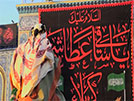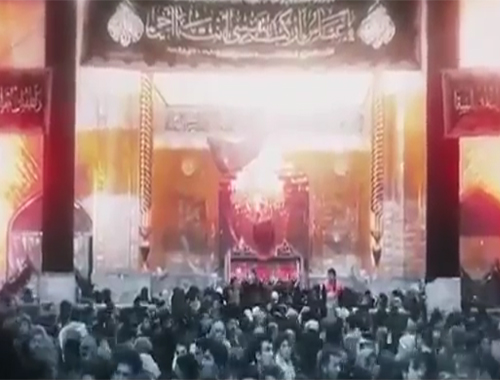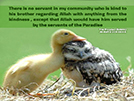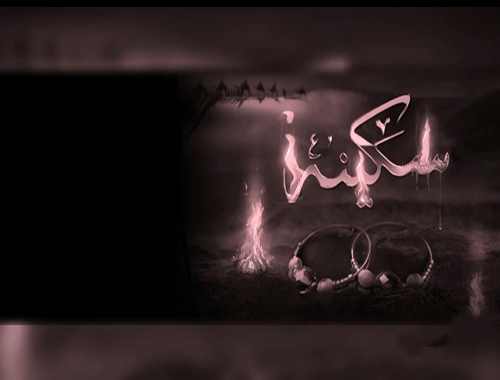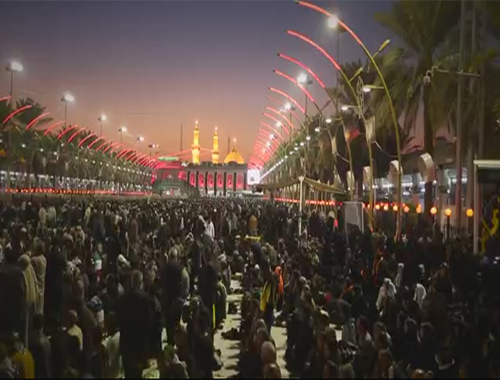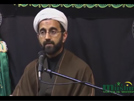Verse94-101
- Details
- Hits: 2902
(94) قُلْ إِن كَانَتْ لَكُمُ الدَّارُ الآَخِرَةُ عِندَ اللّهِ خَالِصَةً مِّن دُونِ النَّاسِ فَتَمَنَّوُاْ الْمَوْتَ إِن كُنتُمْ صَادِقِينَ
(95) وَلَن يَتَمَنَّوْهُ أَبَدًا بِمَا قَدَّمَتْ أَيْدِيهِمْ وَاللّهُ عَلِيمٌ بِالظَّالِمينَ
(96) وَلَتَجِدَنَّهُمْ أَحْرَصَ النَّاسِ عَلَى حَيَاةٍ وَمِنَ الَّذِينَ أَشْرَكُواْ يَوَدُّ أَحَدُهُمْ لَوْ يُعَمَّرُ أَلْفَ سَنَةٍ وَمَا هُوَ بِمُزَحْزِحِهِ مِنَ الْعَذَابِ أَن يُعَمَّرَ وَاللّهُ بَصِيرٌ بِمَا يَعْمَلُونَ
(97) قُلْ مَن كَانَ عَدُوًّا لِّجِبْرِيلَ فَإِنَّهُ نَزَّلَهُ عَلَى قَلْبِكَ بِإِذْنِ اللّهِ مُصَدِّقاً لِّمَا بَيْنَ يَدَيْهِ وَهُدًى وَبُشْرَى لِلْمُؤْمِنِينَ
(98) مَن كَانَ عَدُوًّا لِّلّهِ وَمَلآئِكَتِهِ وَرُسُلِهِ وَجِبْرِيلَ وَمِيكَالَ فَإِنَّ اللّهَ عَدُوٌّ لِّلْكَافِرِينَ
(99) وَلَقَدْ أَنزَلْنَآ إِلَيْكَ آيَاتٍ بَيِّنَاتٍ وَمَا يَكْفُرُ بِهَا إِلاَّ الْفَاسِقُونَ
(100) أَوَكُلَّمَا عَاهَدُواْ عَهْداً نَّبَذَهُ فَرِيقٌ مِّنْهُم بَلْ أَكْثَرُهُمْ لاَ يُؤْمِنُونَ
(101) وَلَمَّا جَاءهُمْ رَسُولٌ مِّنْ عِندِ اللّهِ مُصَدِّقٌ لِّمَا مَعَهُمْ نَبَذَ فَرِيقٌ مِّنَ الَّذِينَ أُوتُواْ الْكِتَابَ كِتَابَ اللّهِ وَرَاء ظُهُورِهِمْ كَأَنَّهُمْ لاَ يَعْلَمُونَ
94. " Say: ' If the Last Abode with Allah is yours exclusively and not for other people, then long for death if you are truthful '. "
95. " But never will they long for death, because of what their hands have sent forth; for Allah well knows the unjust. "
96. " Indeed, you will find them the greediest of people for life, even more than those who associate partners (to Allah); each one of them is covetous to live (even) a thousand years, yet the prolongation of his life shall not remove him further away from the punishment. Allah sees what they do. "
97. " Say (O' Muhammad): ' Whoever is an enemy to Gabriel, who brought down (the Qur'an) upon your heart by Allah's leave, confirming what was before it, and a guidance and glad tidings for the believers ' ; "
98." And whoever is an enemy to Allah, His angels, His Messengers, Gabriel and Michael (should know that) Allah is surely an enemy to the infidels. "
99. " Verily, We have sent down to you clear Signs, and none denies them except the transgressors. "
100. " What! Whenever they made a covenant, a group of them cast it aside ? Nay, most of them do not (truly) believe. "
101. " And when there came to them a Messenger from Allah, confirming what was with them, a part of them who were given the Book cast the Book of Allah behind their backs, as though they knew (it) not! "
* * * *
Commentary :
" Say: ' If the Last Abode with Allah is yours exclusively and not for other people, ..."
From the former verses, it was understood that the Jews claimed that they would not be touched by the Fire but for a few days when they worshipped the Calf, saying: " The Fire shall not touch us but for a few days ". Also, when they were told to believe in Allah's revelation, they replied that they would believe only in their Book, the Turah: " We believe (only) in what was sent down to us (before). " They imagined that they were the only people who would be qualified for salvation and felicity, while other nations would be punished and receive eternal destruction in the Hereafter. Then, to cancel this kind of idea and to verify that the case is not as they considered, it is told them:
"... then long for death if you are truthful '."
The Messenger of Allah is commanded to tell them that if the abode of the Hereafter and the blessings of Heaven are exclusively theirs, they must strive to reach such bliss and invoke for death in order to get rid of the disasters and miseries of this world. It is in this situation that they would attain eternal happiness which they falsely think belongs to them alone.
* * * *
" But never will they long for death, because of what their hands have sent forth; ... "
"... for Allah well knows the unjust."
And in another occurrence, as a protest to them, the Qur'an says: "... If you think that you are friends to Allah, to the exclusion of (other) men, then invoke your desire for death if you are truthful! ", (Sura Al-Jumu'ah, No. 62, verse 6).
Yes, a sincere friend desires to be with his friend, someone in love wishes to see one's love, and a seeker of a particular thing is anxious and desirous to obtain that which one is seeking.
Worldly affairs and materialism often stand as a curtain or barrier between Allah and His servants. They usually do not let one approach Him and be acquainted with his / her Creator deservingly. Therefore, the true sincerity towards Him is the desire of death. Then, here, to unvail the falsehood of the statement of the Jews, Allah announces that if they truly believe that the future abode with Allah is exclusively theirs and think that only they are those who are the favoured people of Allah, not any other people, they must invoke death with their tongues, hearts, and actions to reach Him without any natural barrier.
" Indeed, you will find them the greediest of people for life, even more than those who associate partners (to Allah);..."
But they never invoke death because they are the greediest of all people for the life of this world. They love the long life of this world even much more than pagans and idolators.
"... each one of them is covetous to live (even) a thousand years, ..."
Besides their hideous deeds and that they do not seek death in order to meet the Lord, each of them would like to live one thousand years.
The figure ' one thousand years ' metaphorically refers to the idea that they wish to live a long life. This is evidence to their lie and they know that neither the Last Abode with Allah is theirs, nor are they the friends of Allah. They arrogantly state these things, based on bigotry, in order to tell the Muslims that both the Jews and their ancestral religion are right, and Muslims are wrong and their religion is untrue. Then Allah, by this clear evidence, made their falsehood manifest by stating that the friends of Allah are those who are desirous of death to attain their goal.
"... yet the prolongation of his life shall not remove him further away from the punishment. ..."
"... Allah sees what they do."
That is, the Jews will never long for death, then how can they desire a long life when it does not save them from the punishment ? Yet, they are the greediest people for the low life of this world which can be a barrier obstructing entrance into the everlasting felicity of the life in the coming world. Furthermore, the members of this group having belief in the Hereafter and the life after death, are greedier for the life of this world than pagans and blasphemers, who wrongly believe that Man will be destroyed and perish after death.
" Say (O' Muhammad): ' Whoever is an enemy to Gabriel, ..."
The commentators believe that as 'Abdullah-ibn-Abbas cites, the occasion of revelation of this verse was as follows:
One of the scholars of the Jews by the name of Ibn-Suriya, with a group of Jewish people from Fadak, was attending the holy Prophet (p.b.u.h.) when he put forth some questions to test his gift of prophecy. Thereby being convinced that Muhammad (p.b.u.h.) was a true prophet of Allah, he asked as to which of Allah's angels had conveyed the Divine messages to him, and he (p.b.u.h.) answered that Gabriel had.
The Jew said he would not believe, as Gabriel was the enemy of his people and he is the angel of punishment, annoyance, displeasure, indignation, and execution; while Michael was not, and if Michael would have been the one who came down to the Prophet (p.b.u.h.), then they would believe in him (p.b.u.h.). So, Allah (s.w.t.) sent down this verse and told the holy Prophet (p.b.u.h.) to say that he who is the enemy of Gabriel, is the enemy of the one:
"... who brought down (the Qur'an) upon your heart by Allah's leave, ..."
"... confirming what was before it, and a guidance and glad tidings for the believers ' ; "
Thus, the Qur'an attests to the rightfulness of all the heavenly Books such as the Turah, the Evangil, Psalms of David, the Written Sheets (Scriptures), and what Allah had sent to other prophets (a.s.). The word /hudan/ ' a guidance ' here, may refer to the guidance of the Qur'an for all of the believing members of the Jinn and humans. The guidance is apportioned to the believers perhaps for the reason that it is only the believers who are benefited by the Qur'an, so therefore, the glad tidings are given to them.
* * * *
Now, this verse reiterates the subject matter of the previous verse but with more emphasis and accompanied with a threat. It says:
" And whoever is an enemy to Allah, His angels, His Messengers, Gabriel and Michael (should know that) Allah is surely an enemy to the infidels. "
This statement is an indication to the meaning that these instances are not separable. The Essence of Allah, angels, all His Messengers, Gabriel and Michael or any other angels, from this point of view, are all the same and to have enmity with one of them is, in fact, having enmity with the others.
In other words, Allah's ordinances, which are helpful on the path to development of the human race, have been revealed from His Origin unto prophets (p.b.u.th.) by means of angels. And if there be any difference between their missions, it is a difference of the division of responsibilities, not a contrast in missions. They are all alongside the path of the same goal. So, being an enemy against one of them is showing enmity against Allah.
* * * *
Upon the occasion of revelation of verse 99, there is a narration from Ibn-Abbas who said: " Ibn-Suriya, a Jewish scholar, told the Prophet (p.b.u.h.): ' O Muhammad, you have not brought anything for us that we understand it, and also the Lord has not sent a clear sign to you so that we follow you thereby '. Then, Allah sent down this verse which was a frank vivid answer to that statement. (1)
None Denies Divine Signs Save the Transgressors!
Through this verse, the Qur'an points to the fact that Allah has given the Prophet of Islam (p.b.u.h.) enough evidence and sufficient Signs all of which are so clear that nobody can deny them. Hence, those who deny them, indeed, have recognized the rightfulness of his invitation, but, because of their special evil intentions, they oppose it.
" verily, we have sent down to you clear signs, and none denies them except the transgressors "
Contemplation over the verses of the Qur'an makes the way clear for any pure-hearted truth-seeker. By reciting these verses, the reality and truthfulness of the invitation of the prophet of Islam (P.B.U.H.), as well as the understand this meaning that their hearts have not been darkened as a result of committing sin. Thus, is it not surprising that transgressors and those who have stained themselves with sins by disobeying the commands of Allah, never believe in Islam.
* * * *
"What! Whenever they made a cavenant, a group of them cast it aside? Nay, most of them do not (truly) believe."
with reference to the previous verses, this verse is also a protest against the Jews as to why some of these people neglect and breach their covenant that they make whit Allah. They not only breake their covenant but also have no faith at all. It may refer to this idea that ifhey believed in Allah and His prophets (a.s.), they would never break their covenant or never fail in their promise.
* * * *
" And when there came to them a Messenger from Allah, confirming what was with them, ... "
The purpose of the term ' Messenger ', here, may be the Last Prophet (p.b.u.h.), or it may refer to all those prophets (a.s.) who came after Moses (a.s.), because, according to the previous verses, the Qur'an protests against the Jews for rejecting all of the great prophets after Moses (a.s.). These prophets (a.s.), with their Divine commissions, abrogated Moses' religion whereas, in the meantime, they confirmed the rightfulness of what the Jews had in their hands the Turah yet, some of them (the Jews) put the Book of Allah behind their backs:
"... a part of them who were given the Book cast the Book of Allah behind their backs, ..."
Some of the learned men of the Jews put the Book of Allah, the Turah, which attested to the prophethood of the Last Messenger of Allah, Prophet Muhammad (p.b.u.h.), " behind their backs " and, by neglecting his specific description which was recorded in the Turah, they abandoned it totally:
"... as though they knew (it) not ! "
(1) Majma'-ul-Bayan, vol. 1, p. 168

